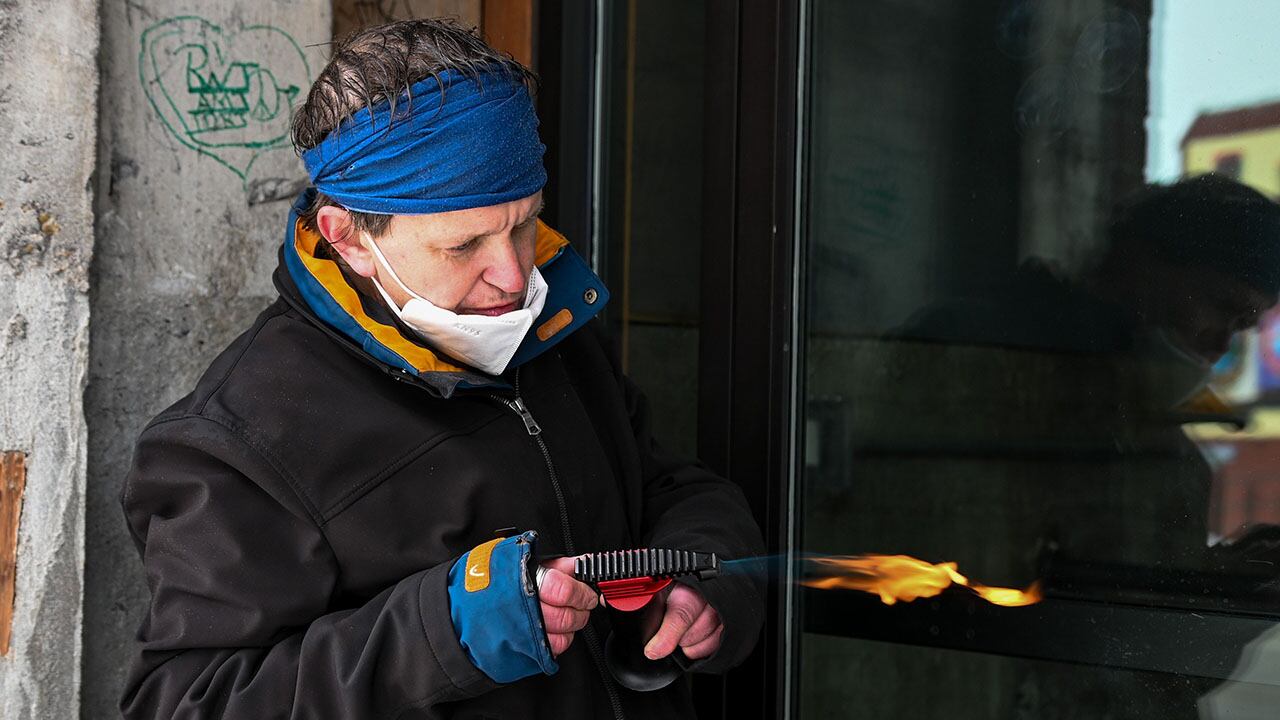During the four days of winter storm that dropped 10 inches of snow on Portland, then a layer of tree-snapping ice, Multnomah County opened severe weather shelters to keep houseless people and campers out of potentially lethal temperatures.
Two of the shelters—one in North Portland and one at the Oregon Convention Center—were indoor shelters with social distance protocols in place and rapid-response COVID tests administered at the door. A third, an open-air shelter in a Lloyd Center parking garage, didn't require a COVID test to enter and furnished people with warm weather buffering items like tents, sleeping bags, hot cider and soup.
The parking structure shelter—which smelled of new tent and pumped warm air into the space through a series of long plastic tubes—was open 24 hours a day. The other two indoor shelters were meant to close during the day and reopen at 8 pm. But the storm's alternating inches of snow and freezing rain prompted the county to keep people indoors—if they wanted to stay.

How people arrived at the severe weather shelters varied. Some heard about them at hospitals, others by calling 211—the local information number. Portland Fire & Rescue shuttled people to the shelters in red sprinter vans. PF&R also ran the rapid-response COVID testing.
Those COVID tests were one of the main reasons people gave for staying away from the severe weather shelters. Others said they were worried about losing their tents and belongings, which they couldn't carry across the river. Addictions couldn't be fed inside the shelters. Some said they did badly among large groups of people.
Throughout the winter storm, we walked around Portland and talked to people inside and outside the shelters to get a view of how they were keeping warm. Here are four.

Mindy, Downtown Portland
Lifelong Portlander Mindy stayed at the Oregon Convention Center shelter on Friday night (she showed off the yellow wristband that meant she'd been COVID-tested), but came back during the day to check on her camp and the friends in nearby tents who were watching her belongings. Her stuff was still there, but her tent had collapsed under layers of snow and ice.
Mindy tried to explain why her friends stayed away from the shelters. "When I'm inside, I feel trapped," she said.
"Or we're just lazy!" a laughing voice shouted from inside a nearby tent.
On Saturday, TriMet's canceled service left Mindy stranded outside again, after she tried and failed to walk back across the Steel Bridge through the high drifts of snow. At night, she and her fellow campers burned wood and ethanol in a metal fire pit between their tents. When asked how she was keeping warm during the day, Mindy replied, "I'm not."

Shawn, Downtown Portland
A recent Arkansas transplant who came to Portland as a self-directed Christian missionary, Shawn said he worried that the COVID nose swab might tear the delicate scar tissue in his sinuses—the result of an old injury.
He said he'd been sleeping outdoors with a good tent and sleeping bag, and keeping warm with a lighter. And he seemed jovial to receive an additional tarp from Potluck in the Park on Sunday afternoon.
Sunday is a day when many charity and social service meal sites close, but PIP is closing in on 30 years of afternoon outdoor meals, without a single missed Sunday.

Andrea, Oregon Convention Center Severe Weather Shelter
"About 7 am is the coldest part," Andrea said, over a cigarette. She and her 25-year-old son had been in and out of shelters since March 2020, when they lost their jobs working security at University of Oregon events in Eugene. The shelters generally kicked them out first thing in the morning, she said. "We stand close to buildings, out of the rain, or head over to the Lloyd Center"—where there's a houseless encampment.
"Eugene has absolutely zero jobs," Andrea said, explaining what brought them to Portland. "But we made good money, at first, working DoorDash up here." Then their car broke down and became so moldy they could no longer sleep in it. "We've been doing DoorDash on the bus," she said, "but staying in shelters—they're not set up for working people. You spend so much time standing in lines, and you have to show up at 8 pm when we could be working."
On Saturday night, she and her son were staying at the Oregon Convention Center, taking turns watching their possessions. "I'm so bored!" Andrea shouted, but she was happy to be out of the snow and raved about the food donated by local restaurants. She'd delivered Elephants Deli on DoorDash, but had never actually tried it before.
But uncertainty loomed. TriMet's unprecedented shutdown boded poorly for her gig job work, when the severe weather shelter closed. "I have no plans," she said, squaring her jaw. "There doesn't seem to be a program set up for someone like me."

Unnamed Man With Blowtorch, Northeast Portland
"This lighter thing is great, man." A pair of men stood beneath the closed Left Bank Annex entrance, showing off a small blowtorch. "You can light a smoke in the wind, no problem."
They didn't want to give their names but had no problem talking about staying warm. Both wore multiple layers of hoodies. One stood far back in the covered doorway of a building, smoking a bent cigarette, determined to take advantage of what little shelter he could from the wind. The other adjusted the gas setting on the torch and began warming his hands.
Both men stayed in shelters the first two nights but needed to leave to find drugs outside. TriMet's suspended and limited services stranded them too far away to carry their possessions on foot.
"You see any buses running? Because I don't," the man with the blowtorch said.
Like others, the two men felt forced to make a decision: either stay in their tents overnight during the storm or walk to the nearest shelter, leaving their possessions vulnerable to theft.
The man with the blowtorch motioned to the two tiny tents on the sidewalk, under several layers of tarps, snow and ice. "I don't need no shelter," he said. "This is shelter right here."



